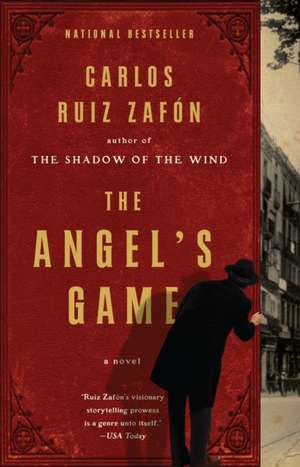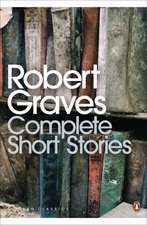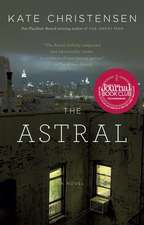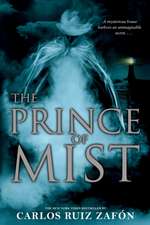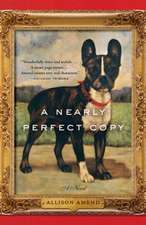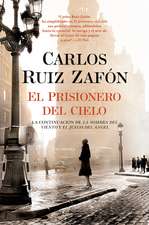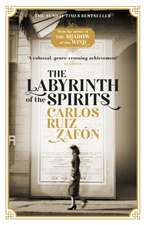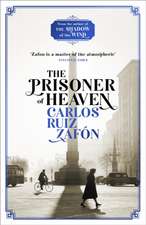The Angel's Game
Autor Carlos Ruiz Zafon Traducere de Lucia Gravesen Limba Engleză Paperback – 30 apr 2010
In this powerful, labyrinthian thriller, David Martín is a pulp fiction writer struggling to stay afloat. Holed up in a haunting abandoned mansion in the heart of Barcelona, he furiously taps out story after story, becoming increasingly desperate and frustrated. Thus, when he is approached by a mysterious publisher offering a book deal that seems almost too good to be real, David leaps at the chance. But as he begins the work, and after a visit to the Cemetery of Forgotten Books, he realizes that there is a connection between his book and the shadows that surround his dilapidated home and that the publisher may be hiding a few troubling secrets of his own. Once again, Ruiz Zafón takes us into a dark, gothic Barcelona and creates a breathtaking tale of intrigue, romance, and tragedy
Preț: 112.19 lei
Nou
Puncte Express: 168
Preț estimativ în valută:
21.47€ • 22.41$ • 17.77£
21.47€ • 22.41$ • 17.77£
Carte disponibilă
Livrare economică 15-29 martie
Preluare comenzi: 021 569.72.76
Specificații
ISBN-13: 9780767931113
ISBN-10: 0767931114
Pagini: 531
Dimensiuni: 135 x 203 x 26 mm
Greutate: 0.38 kg
Editura: Anchor Books
ISBN-10: 0767931114
Pagini: 531
Dimensiuni: 135 x 203 x 26 mm
Greutate: 0.38 kg
Editura: Anchor Books
Notă biografică
CARLOS RUIZ ZAFÓN, author of The Shadow of the Wind and other novels, is one of the world’s most read and best-loved writers. His work has been translated into more than forty languages and published around the world, garnering numerous international prizes and reaching millions of readers. He divides his time between Barcelona and Los Angeles.
Extras
A writer never forgets the first time he accepted a few coins or a word of praise in exchange for a story. He will never forget the sweet poison of vanity in his blood and the belief that, if he succeeds in not letting anyone discover his lack of talent, the dream of literature will provide him with a roof over his head, a hot meal at the end of the day, and what he covets the most: his name printed on a miserable piece of paper that surely will outlive him. A writer is condemned to remember that moment, because from then on he is doomed and his soul has a price.
My first time came one faraway day in December 1917. I was seventeen and worked at The Voice of Industry, a newspaper that had seen better days and now languished in a barn of a building that had once housed a sulfuric acid factory. The walls still oozed the corrosive vapor that ate away at furniture and clothes, sapping the spirits, consuming even the soles of shoes. The newspaper’s headquarters rose behind the forest of angels and crosses of the Pueblo Nuevo cemetery; from afar, its outline merged with the mausoleums silhouetted against the horizon–a skyline stabbed by hundreds of chimneys and factories that wove a perpetual twilight of scarlet and black above Barcelona.
On the night that was about to change the course of my life, the newspaper’s deputy editor, Don Basilio Moragas, saw fit to summon me, just before closing time, to the dark cubicle at the far end of the editorial staff room that doubled as his office and cigar den. Don Basilio was a forbidding- looking man with a bushy moustache who did not suffer fools and who subscribed to the theory that the liberal use of adverbs and adjectives was the mark of a pervert or someone with a vitamin deficiency. Any journalist prone to florid prose would be sent off to write funeral notices for three weeks. If, after this penance, the culprit relapsed, Don Basilio would ship him off permanently to the "House and Home" pages. We were all terrified of him, and he knew it.
"Did you call me, Don Basilio?" I ventured timidly.
The deputy editor looked at me askance. I entered the office, which smelled of sweat and tobacco in that order. Ignoring my presence, Don Basilio continued to read through one of the articles lying on his table, a red pencil in hand. For a couple of minutes, he machine- gunned the text with corrections and amputations, muttering sharp comments as if I weren’t there. Not knowing what to do, and noticing a chair placed against the wall, I slid toward it.
"Who said you could sit down?" muttered Don Basilio without raising his eyes from the text.
I quickly stood up and held my breath. The deputy editor sighed, let his red pencil fall, and leaned back in his armchair, eyeing me as if I were some useless piece of junk.
"I’ve been told that you write, Martin."
I gulped. When I opened my mouth only a ridiculous, reedy voice emerged.
"A little, well, I don’t know, I mean, yes, I do write..."
"I hope you write better than you speak. And what do you write– if that’s not too much to ask?"
"Crime stories. I mean..."
"I get the idea."
The look Don Basilio gave me was priceless. If I’d said I devoted my time to sculpting figures for Nativity scenes out of fresh dung I would have drawn three times as much enthusiasm from him. He sighed again and shrugged his shoulders.
"Vidal says you’re not altogether bad. He says you stand out."
"Of course, with the sort of competition in this neck of the woods, one doesn’t have to run very fast. Still, if Vidal says so."
Pedro Vidal was the star writer at The Voice of Industry. He penned a weekly column on crime and lurid events–the only thing worth reading in the whole paper. He was also the author of a dozen modestly successful thrillers about gangsters in the Raval quarter carrying out bedroom intrigues with ladies of high society. Invariably dressed in impeccable silk suits and shiny Italian moccasins, Vidal had the looks and the manner of a matinee idol: fair hair always well combed, a pencil moustache, and the easy, generous smile of someone who feels comfortable in his own skin and at ease with the world. He belonged to a family whose forebears had made their pile in the Americas in the sugar business and, on their return to Barcelona, had bitten off a large chunk of the city’s electricity grid. His father, the patriarch of the clan, was one of the newspaper’s main shareholders, and Don Pedro used its offices as a playground to kill the tedium of never having worked out of necessity a single day in his life. It mattered little to him that the newspaper was losing money as quickly as the new automobiles that were beginning to circulate around Barcelona leaked oil: with its abundance of nobility, the Vidal dynasty was now busy collecting banks and plots of land the size of small principalities in the new part of town known as the Ensanche.
Pedro Vidal was the first person to whom I had dared show rough drafts of my writing when, barely a child, I carried coffee and cigarettes round the staff room. He always had time for me: he read what I had written and gave me good advice. Eventually, he made me his assistant and would allow me to type out his drafts. It was he who told me that if I wanted to bet on the Russian roulette of literature, he was willing to help me and set me on the right path. True to his word, he had now thrown me into the clutches of Don Basilio, the newspaper’s Cerberus.
"Vidal is a sentimentalist who still believes in those profoundly un-Spanish myths such as meritocracy or giving opportunities to those who deserve them rather than to the current favorite. Loaded as he is, he can allow himself to go around being a free spirit. If I had one hundredth of the cash he doesn’t even need I would have devoted my life to honing sonnets and little twittering nightingales would come to eat from my hand, captivated by my kindness and charm."
"Senor Vidal is a great man!"I protested.
"He’s more than that. He’s a saint, because although you may look scruffy he’s been banging on at me for weeks about how talented and hardworking the office boy is. He knows that deep down I’m a softy and, besides, he’s assured me that if I give you this break he’ll present me with a box of Cuban cigars. And if Vidal says so, it’s as good as Moses coming down from the mountain with the lump of stone in his hand and the revealed truth shining from his forehead. So, to get to the point, because it’s Christmas and because I want your friend to shut up once and for all, I’m offering you a head start, against wind and tide."
"Thank you so much, Don Basilio. I promise you won’t regret it."
"Don’t get too carried away, boy. Let’s see, what do you think of the indiscriminate use of adjectives and adverbs?"
"I think it’s a disgrace and should be set down in the penal code,"I replied with the conviction of a zealot.
Don Basilio nodded in approval.
"You’re on the right track, Martin. Your priorities are clear. Those who make it in this business have priorities, not principles. This is the plan. Sit down and concentrate, because I’m not going to tell you twice."
The plan was as follows. For reasons that Don Basilio thought best not to set out in detail, the back page of the Sunday edition, which was traditionally reserved for a short story or a travel feature, had fallen through at the last minute. The content was to have been a fiery narrative in a patriotic vein about the exploits of Catalan medieval knights who saved Christianity and all that was decent under the sun, starting with the Holy Land and ending with the banks of our Llobregat delta. Unfortunately, the text had not arrived in time or, I suspected, Don Basilio simply didn’t want to publish it. This left us, only six hours before deadline, with no other substitute for the story than a full- page advertisement for whalebone corsets that guaranteed perfect hips and full immunity from the effects of buttery by-products. The editorial board had opted to take the bull by the horns and make the most of the literary excellence that permeated every corner of the newspaper. The problem would be overcome by publishing a four- column human interest piece for the entertainment and edification of our loyal family-oriented readership. The list of proven talent included ten names, none of which, needless to say, was mine.
"Martin, my friend, circumstances have conspired so that not one of the champions on our payroll is on the premises or can be contacted in time. With disaster imminent, I have decided to give you your first crack at glory."
"You can count on me."
"I’m counting on five double-spaced pages in six hours, Don Edgar Allan Poe. Bring me a story, not a speech. If I want a sermon, I’ll go to Midnight Mass. Bring me a story I have not read before and, if I have read it, bring it to me so well written and narrated that I won’t even notice."
I was about to leave the room when Don Basilio got up, walked round his desk, and rested a hand, heavy and large as an anvil, on my shoulder. Only then, when I saw him close up, did I notice a twinkle in his eyes.
"If the story is decent I’ll pay you ten pesetas. And if it’s better than decent and our readers like it, I’ll publish more."
"Any specific instructions, Don Basilio?"I asked.
"Yes. Don’t let me down."
. . .
I spent the next six hours in a trance. I installed myself at a table that stood in the middle of the editorial room and was reserved for Vidal, on the days when he felt like dropping by. The room was deserted, submerged in a gloom thick with the smoke of a thousand cigarettes. Closing my eyes for a moment, I conjured up an image, a cloak of dark clouds spilling down over the city in the rain, a man walking under cover of shadows with blood on his hands and a secret in his eyes. I didn’t know who he was or what he was fleeing from, but during the next six hours he was going to become my best friend. I slid a page into the typewriter and without pausing, I proceeded to squeeze out everything I had inside me. I quarreled with every word, every phrase and expression, every image and letter as if they were the last I was ever going to write. I wrote and rewrote every line as if my life depended on it, and then rewrote it again. My only company was the incessant clacking of the typewriter echoing in the darkened hall and the large clock on the wall exhausting the minutes left until dawn.
. . .
Shortly before six o’clock in the morning I pulled the last sheet out of the typewriter and sighed, utterly drained. My brain felt like a wasp’s nest. I heard the heavy footsteps of Don Basilio, who had emerged from one of his brief naps and was approaching unhurriedly. I gathered up the pages and handed them to him, not daring to meet his gaze. Don Basilio sat down at the next table and turned on the lamp. His eyes skimmed the text, betraying no emotion. Then he rested his cigar on the end of the table for a moment, glared at me, and read out the first line:
Night falls on the city and the streets carry the scent of gunpowder like the breath of a curse.
Don Basilio looked at me out of the corner of his eye and I hid behind a smile that didn’t leave a single tooth uncovered. Without saying another word, he got up and left with my story in his hands. I saw him walking toward his office and closing the door behind him. I stood there, petrified, not knowing whether to run away or await the death sentence. Ten minutes later–it felt more like ten years to me–the door of the deputy editor’s office opened and the voice of Don Basilio thundered right across the department.
"Martin. In here. Now."
I dragged myself along as slowly as I could, shrinking a centimeter or two with every step, until I had no alternative but to show my face and look up. Don Basilio, the fearful red pencil in hand, was staring at me icily. I tried to swallow, but my mouth was dry. He picked up the pages and gave them back to me. I took them and turned to go as quickly as I could, telling myself that there would always be room for another shoeshine boy in the lobby of Hotel Coln.
"Take this down to the composing room and have them set it,"said the voice behind me.
I turned round, thinking I was the object of some cruel joke. Don Basilio pulled open the drawer of his desk, counted out ten pesetas, and put them on the table.
"This belongs to you. I suggest you buy yourself a better suit with it–I’ve seen you wearing the same one for four years and it’s still about six sizes too big. Why don’t you pay a visit to Senor Pantaleoni at his shop in Calle Escudellers? Tell him I sent you. He’ll look after you."
"Thank you so much, Don Basilio. That’s what I’ll do."
"And start thinking about another of these stories for me. I’ll give you a week for the next one. But don’t fall asleep. And let’s see if we can have a lower body count this time–today’s readers like a slushy ending in which the greatness of the human spirit triumphs over adversity, that sort of rubbish."
"Yes, Don Basilio."
The deputy editor nodded and held out his hand to me. I shook it.
"Good work, Martin. On Monday I want to see you at the desk that belonged to Junceda. It’s yours now. I’m putting put you on the crime beat."
"I won’t fail you, Don Basilio."
"No, you won’t fail me. You’ll just cast me aside sooner or later. And you’ll be right to do so, because you’re not a journalist and you never will be. But you’re not a crime novelist yet, even if you think you are. Stick around for a while and we’ll teach you a thing or two that will always come in handy."
At that moment, my guard down, I was so overwhelmed by gratitude that I wanted to hug that great bulk of a man. Don Basilio, his fierce mask back in place, gave me a steely look and pointed toward the door.
"No scenes, please. Close the door. And happy Christmas."
"Happy Christmas."
. . .
The following Monday, when I arrived at the editorial room ready to sit at my own desk for the very Þrst time, I found a coarse gray envelope with a ribbon and my name on it in the same recognizable type that I had been typing out for years. I opened it. Inside was a framed copy of my story from the back page of the Sunday edition, with a note saying:
"This is just the beginning. In ten years I’ll be the apprentice and you’ll be the teacher. Your friend and colleague, Pedro Vidal."
From the Hardcover edition.
My first time came one faraway day in December 1917. I was seventeen and worked at The Voice of Industry, a newspaper that had seen better days and now languished in a barn of a building that had once housed a sulfuric acid factory. The walls still oozed the corrosive vapor that ate away at furniture and clothes, sapping the spirits, consuming even the soles of shoes. The newspaper’s headquarters rose behind the forest of angels and crosses of the Pueblo Nuevo cemetery; from afar, its outline merged with the mausoleums silhouetted against the horizon–a skyline stabbed by hundreds of chimneys and factories that wove a perpetual twilight of scarlet and black above Barcelona.
On the night that was about to change the course of my life, the newspaper’s deputy editor, Don Basilio Moragas, saw fit to summon me, just before closing time, to the dark cubicle at the far end of the editorial staff room that doubled as his office and cigar den. Don Basilio was a forbidding- looking man with a bushy moustache who did not suffer fools and who subscribed to the theory that the liberal use of adverbs and adjectives was the mark of a pervert or someone with a vitamin deficiency. Any journalist prone to florid prose would be sent off to write funeral notices for three weeks. If, after this penance, the culprit relapsed, Don Basilio would ship him off permanently to the "House and Home" pages. We were all terrified of him, and he knew it.
"Did you call me, Don Basilio?" I ventured timidly.
The deputy editor looked at me askance. I entered the office, which smelled of sweat and tobacco in that order. Ignoring my presence, Don Basilio continued to read through one of the articles lying on his table, a red pencil in hand. For a couple of minutes, he machine- gunned the text with corrections and amputations, muttering sharp comments as if I weren’t there. Not knowing what to do, and noticing a chair placed against the wall, I slid toward it.
"Who said you could sit down?" muttered Don Basilio without raising his eyes from the text.
I quickly stood up and held my breath. The deputy editor sighed, let his red pencil fall, and leaned back in his armchair, eyeing me as if I were some useless piece of junk.
"I’ve been told that you write, Martin."
I gulped. When I opened my mouth only a ridiculous, reedy voice emerged.
"A little, well, I don’t know, I mean, yes, I do write..."
"I hope you write better than you speak. And what do you write– if that’s not too much to ask?"
"Crime stories. I mean..."
"I get the idea."
The look Don Basilio gave me was priceless. If I’d said I devoted my time to sculpting figures for Nativity scenes out of fresh dung I would have drawn three times as much enthusiasm from him. He sighed again and shrugged his shoulders.
"Vidal says you’re not altogether bad. He says you stand out."
"Of course, with the sort of competition in this neck of the woods, one doesn’t have to run very fast. Still, if Vidal says so."
Pedro Vidal was the star writer at The Voice of Industry. He penned a weekly column on crime and lurid events–the only thing worth reading in the whole paper. He was also the author of a dozen modestly successful thrillers about gangsters in the Raval quarter carrying out bedroom intrigues with ladies of high society. Invariably dressed in impeccable silk suits and shiny Italian moccasins, Vidal had the looks and the manner of a matinee idol: fair hair always well combed, a pencil moustache, and the easy, generous smile of someone who feels comfortable in his own skin and at ease with the world. He belonged to a family whose forebears had made their pile in the Americas in the sugar business and, on their return to Barcelona, had bitten off a large chunk of the city’s electricity grid. His father, the patriarch of the clan, was one of the newspaper’s main shareholders, and Don Pedro used its offices as a playground to kill the tedium of never having worked out of necessity a single day in his life. It mattered little to him that the newspaper was losing money as quickly as the new automobiles that were beginning to circulate around Barcelona leaked oil: with its abundance of nobility, the Vidal dynasty was now busy collecting banks and plots of land the size of small principalities in the new part of town known as the Ensanche.
Pedro Vidal was the first person to whom I had dared show rough drafts of my writing when, barely a child, I carried coffee and cigarettes round the staff room. He always had time for me: he read what I had written and gave me good advice. Eventually, he made me his assistant and would allow me to type out his drafts. It was he who told me that if I wanted to bet on the Russian roulette of literature, he was willing to help me and set me on the right path. True to his word, he had now thrown me into the clutches of Don Basilio, the newspaper’s Cerberus.
"Vidal is a sentimentalist who still believes in those profoundly un-Spanish myths such as meritocracy or giving opportunities to those who deserve them rather than to the current favorite. Loaded as he is, he can allow himself to go around being a free spirit. If I had one hundredth of the cash he doesn’t even need I would have devoted my life to honing sonnets and little twittering nightingales would come to eat from my hand, captivated by my kindness and charm."
"Senor Vidal is a great man!"I protested.
"He’s more than that. He’s a saint, because although you may look scruffy he’s been banging on at me for weeks about how talented and hardworking the office boy is. He knows that deep down I’m a softy and, besides, he’s assured me that if I give you this break he’ll present me with a box of Cuban cigars. And if Vidal says so, it’s as good as Moses coming down from the mountain with the lump of stone in his hand and the revealed truth shining from his forehead. So, to get to the point, because it’s Christmas and because I want your friend to shut up once and for all, I’m offering you a head start, against wind and tide."
"Thank you so much, Don Basilio. I promise you won’t regret it."
"Don’t get too carried away, boy. Let’s see, what do you think of the indiscriminate use of adjectives and adverbs?"
"I think it’s a disgrace and should be set down in the penal code,"I replied with the conviction of a zealot.
Don Basilio nodded in approval.
"You’re on the right track, Martin. Your priorities are clear. Those who make it in this business have priorities, not principles. This is the plan. Sit down and concentrate, because I’m not going to tell you twice."
The plan was as follows. For reasons that Don Basilio thought best not to set out in detail, the back page of the Sunday edition, which was traditionally reserved for a short story or a travel feature, had fallen through at the last minute. The content was to have been a fiery narrative in a patriotic vein about the exploits of Catalan medieval knights who saved Christianity and all that was decent under the sun, starting with the Holy Land and ending with the banks of our Llobregat delta. Unfortunately, the text had not arrived in time or, I suspected, Don Basilio simply didn’t want to publish it. This left us, only six hours before deadline, with no other substitute for the story than a full- page advertisement for whalebone corsets that guaranteed perfect hips and full immunity from the effects of buttery by-products. The editorial board had opted to take the bull by the horns and make the most of the literary excellence that permeated every corner of the newspaper. The problem would be overcome by publishing a four- column human interest piece for the entertainment and edification of our loyal family-oriented readership. The list of proven talent included ten names, none of which, needless to say, was mine.
"Martin, my friend, circumstances have conspired so that not one of the champions on our payroll is on the premises or can be contacted in time. With disaster imminent, I have decided to give you your first crack at glory."
"You can count on me."
"I’m counting on five double-spaced pages in six hours, Don Edgar Allan Poe. Bring me a story, not a speech. If I want a sermon, I’ll go to Midnight Mass. Bring me a story I have not read before and, if I have read it, bring it to me so well written and narrated that I won’t even notice."
I was about to leave the room when Don Basilio got up, walked round his desk, and rested a hand, heavy and large as an anvil, on my shoulder. Only then, when I saw him close up, did I notice a twinkle in his eyes.
"If the story is decent I’ll pay you ten pesetas. And if it’s better than decent and our readers like it, I’ll publish more."
"Any specific instructions, Don Basilio?"I asked.
"Yes. Don’t let me down."
. . .
I spent the next six hours in a trance. I installed myself at a table that stood in the middle of the editorial room and was reserved for Vidal, on the days when he felt like dropping by. The room was deserted, submerged in a gloom thick with the smoke of a thousand cigarettes. Closing my eyes for a moment, I conjured up an image, a cloak of dark clouds spilling down over the city in the rain, a man walking under cover of shadows with blood on his hands and a secret in his eyes. I didn’t know who he was or what he was fleeing from, but during the next six hours he was going to become my best friend. I slid a page into the typewriter and without pausing, I proceeded to squeeze out everything I had inside me. I quarreled with every word, every phrase and expression, every image and letter as if they were the last I was ever going to write. I wrote and rewrote every line as if my life depended on it, and then rewrote it again. My only company was the incessant clacking of the typewriter echoing in the darkened hall and the large clock on the wall exhausting the minutes left until dawn.
. . .
Shortly before six o’clock in the morning I pulled the last sheet out of the typewriter and sighed, utterly drained. My brain felt like a wasp’s nest. I heard the heavy footsteps of Don Basilio, who had emerged from one of his brief naps and was approaching unhurriedly. I gathered up the pages and handed them to him, not daring to meet his gaze. Don Basilio sat down at the next table and turned on the lamp. His eyes skimmed the text, betraying no emotion. Then he rested his cigar on the end of the table for a moment, glared at me, and read out the first line:
Night falls on the city and the streets carry the scent of gunpowder like the breath of a curse.
Don Basilio looked at me out of the corner of his eye and I hid behind a smile that didn’t leave a single tooth uncovered. Without saying another word, he got up and left with my story in his hands. I saw him walking toward his office and closing the door behind him. I stood there, petrified, not knowing whether to run away or await the death sentence. Ten minutes later–it felt more like ten years to me–the door of the deputy editor’s office opened and the voice of Don Basilio thundered right across the department.
"Martin. In here. Now."
I dragged myself along as slowly as I could, shrinking a centimeter or two with every step, until I had no alternative but to show my face and look up. Don Basilio, the fearful red pencil in hand, was staring at me icily. I tried to swallow, but my mouth was dry. He picked up the pages and gave them back to me. I took them and turned to go as quickly as I could, telling myself that there would always be room for another shoeshine boy in the lobby of Hotel Coln.
"Take this down to the composing room and have them set it,"said the voice behind me.
I turned round, thinking I was the object of some cruel joke. Don Basilio pulled open the drawer of his desk, counted out ten pesetas, and put them on the table.
"This belongs to you. I suggest you buy yourself a better suit with it–I’ve seen you wearing the same one for four years and it’s still about six sizes too big. Why don’t you pay a visit to Senor Pantaleoni at his shop in Calle Escudellers? Tell him I sent you. He’ll look after you."
"Thank you so much, Don Basilio. That’s what I’ll do."
"And start thinking about another of these stories for me. I’ll give you a week for the next one. But don’t fall asleep. And let’s see if we can have a lower body count this time–today’s readers like a slushy ending in which the greatness of the human spirit triumphs over adversity, that sort of rubbish."
"Yes, Don Basilio."
The deputy editor nodded and held out his hand to me. I shook it.
"Good work, Martin. On Monday I want to see you at the desk that belonged to Junceda. It’s yours now. I’m putting put you on the crime beat."
"I won’t fail you, Don Basilio."
"No, you won’t fail me. You’ll just cast me aside sooner or later. And you’ll be right to do so, because you’re not a journalist and you never will be. But you’re not a crime novelist yet, even if you think you are. Stick around for a while and we’ll teach you a thing or two that will always come in handy."
At that moment, my guard down, I was so overwhelmed by gratitude that I wanted to hug that great bulk of a man. Don Basilio, his fierce mask back in place, gave me a steely look and pointed toward the door.
"No scenes, please. Close the door. And happy Christmas."
"Happy Christmas."
. . .
The following Monday, when I arrived at the editorial room ready to sit at my own desk for the very Þrst time, I found a coarse gray envelope with a ribbon and my name on it in the same recognizable type that I had been typing out for years. I opened it. Inside was a framed copy of my story from the back page of the Sunday edition, with a note saying:
"This is just the beginning. In ten years I’ll be the apprentice and you’ll be the teacher. Your friend and colleague, Pedro Vidal."
From the Hardcover edition.
Recenzii
“[Zafón's] visionary storytelling prowess is a genre unto itself."--USA Today
"[A] rip-roaring Gothic mystery. . . . Will keep you glued to your deck chair."--Seattle Times
"A wickedly clever tale."--Miami Herald
“Ruiz Zafón’s narrative twists and soars, part dream and part slippery reality brought to live in vivid detail…. A book for story lovers: expansive, rich and slow to digest.”—Denver Post
"Zafón can write up a storm. . . . A dream from which it would be imprudent to awake."--The Washington Post
“Absorbing.... Offers not only plenty of plot intricacies and mystery but also a lyrical style of writing.... A literary centaur in which a meditation on the craft of writing is combined with a thriller.” —Los Angeles Times
"A love letter to all things literary, and a paean to the power of the written word. . . . Zafón is a storyteller with vast gifts."--The Onion
“A thriller laden with Gothic elements. . . . A pleasure to read.”—The Christian Science Monitor
“Zafón, a master of mood and emotional manipulation, guides us through Barcelona's backstreets. . . . Readers who enjoy losing themselves completely in a grand scary story that is at once epic and intimate will find themselves spellbound.”—San Antonio Express-News
"Zafon keeps the twists coming, right down to the last page."--The Oregonian
"As in The Shadow of the Wind, [Zafón] spins a fantastically elaborate plot."--New York Times
“Zafon is a superb and often witty weaver of suspense.”—Cleveland Plain Dealer
"A love letter to all things literary, and a paean to the power of the written word. . . . Zafón is a storyteller with vast gifts."--The Onion
"Zafon takes us into sinful corners, indulging fantasies that are erotic, magical or violent. In the end Zafón is the tempter. Many will fall for his vigorous and exhaustingly relentless story-telling."--The Guardian
“Gothic, fantastical and lushly atmospheric.”—Wall Street Journal
“Irresistible. . . . Writhes and twists. . . . We can compare Zafon to Dickens or Poe, but his brilliant writing puts him in a league of his own. . . . Exquisite.”—Bookreporter
“Endearing and addictive.”—Financial Times
Descriere
From a master storyteller, author of the international phenomenon "The Shadow of the Wind," comes a dazzling new page-turner about the perilous nature of obsession, in literature and in love. Through a dizzyingly constructed labyrinth of secrets, the magic of books, passion, and friendship blends into a masterful story.
